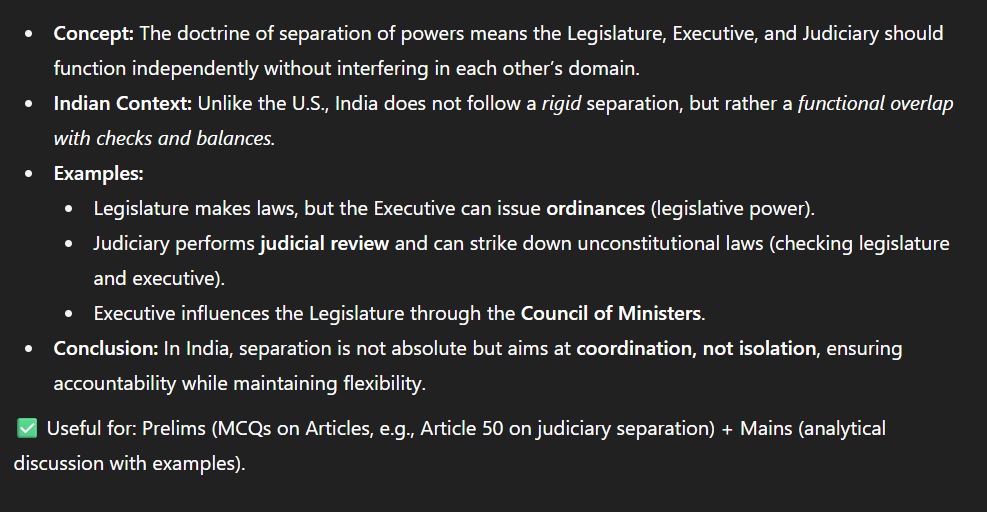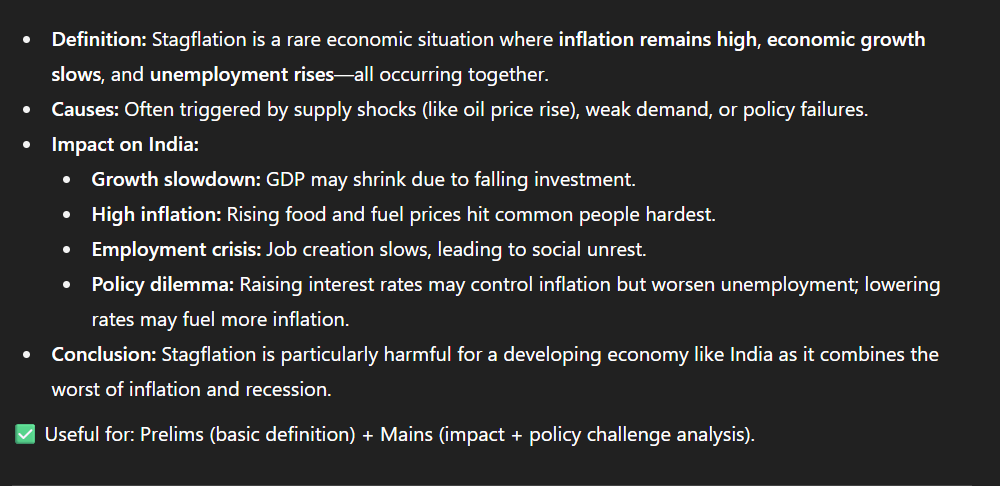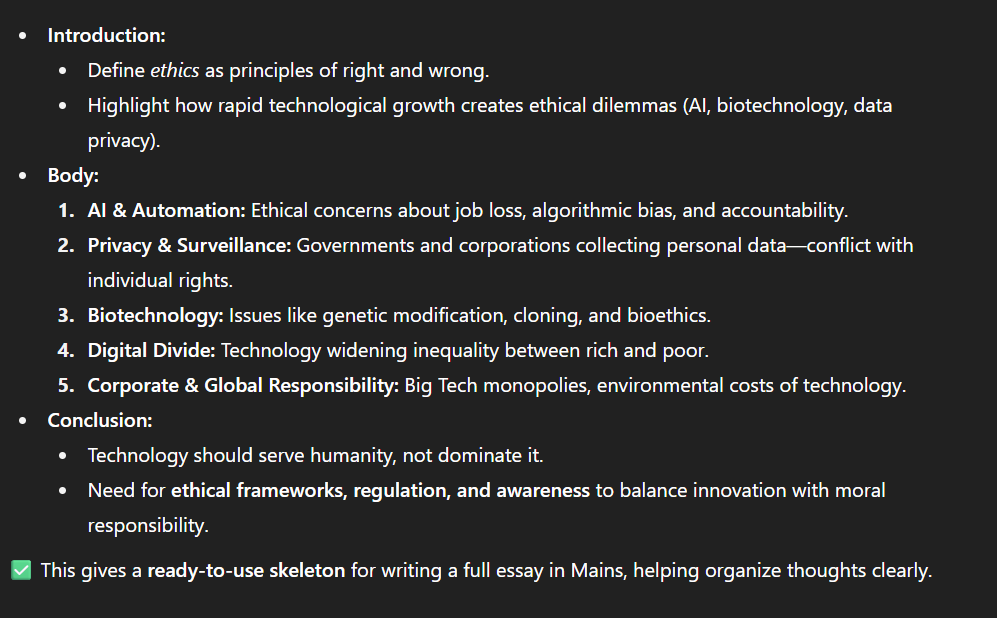How to Study For IAS Exam with ChatGPT ?
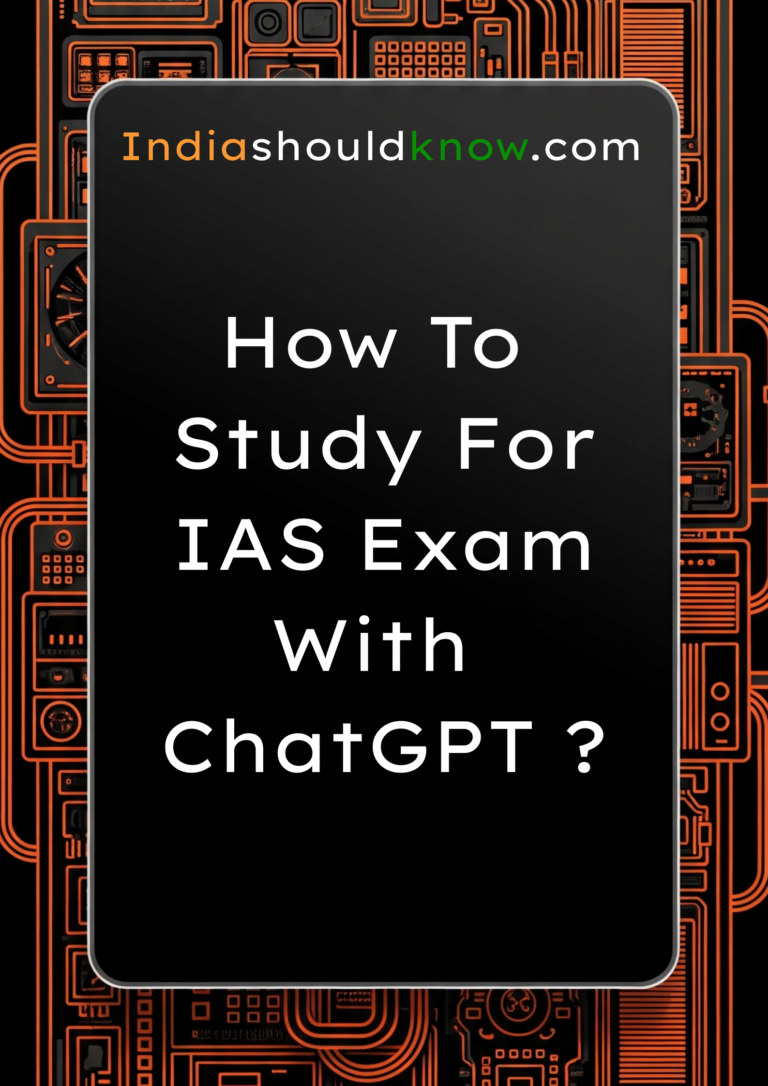
Index
- Introduction – Using ChatGPT To Boost Prep For IAS Exam.
- How To Use ChatGPT Input Methods For IAS Exam Prep.
- Examples For Using ChatGPT Prompts For IAS Exam Subjects.
- Practice Using AI & Prompting With Google AI Chatbot.
- Conclusion
- FAQs.
- Related Articles.
Conquer the IAS Exam with Your AI-Powered Study Partner: ChatGPT
Preparing for the IAS (Indian Administrative Service) exam through the UPSC Civil Services Examination demands a unique blend of comprehensive reading, analytical thinking, and effective revision strategies. While traditional resources such as NCERTs, The Hindu, Yojana, and standard books are essential, combining them with ChatGPT AI can elevate your preparation experience to an entirely new level.
ChatGPT acts like a 24/7 personal mentor, helping you summarize editorials, clarify complex GS topics, generate practice questions, and even frame essay outlines. Whether you’re preparing for Prelims, Mains, or the Interview, ChatGPT offers 360-degree assistance tailored to the IAS syllabus.
I’ve embraced AI tools like Google Gemini every day since ChatGPT launched in November 2022. This has totally changed how I learn and adapt, letting me transition from sales to creating this entire website. AI can truly guide you in mastering new skills.
Lets take a look at how Google Gemini can be a daily support during your IAS Prep.
How Can ChatGPT Help with IAS Exam Preparation ?
Get clear answers and explanations for questions on History, Polity, Geography, or any other IAS exam subject.
Easily discover helpful videos and books online to deepen your understanding of IAS topics.
- Combine study material and create sample papers and practice material made just for the IAS exam to boost your confidence.
- Get help finding or creating images, statistics, and all the material you need for your projects.
Everything you need to conquer the IAS exam is right here.
Ready to Learn how to study anything in your IAS Exam syllabus with the help of OpenAI's powerful tool ChatGPT ?
All You Need is
- Your notes or your text book
Before you start, you need access to ChatGPT. You can either download the app or use it on your browser:
On mobile (iOS or Android):
Download ChatGPT from the App Store
Download ChatGPT from Google PlayOn browser:
Visit ChatGPT on web
Create a free account or log in.
- Read this article to learn how
That’s All you need to make yourself a tutor ready to answer all your questions, at anytime for FREE !!!
And remember to share this article with anyone you think may need it.
How To Use ChatGPT Input Method's For IAS Exam Preparation.
1. Text Prompts

Ideal for asking detailed questions from GS, optional subjects, or essay topics. You can get summaries, explanations, or practice questions.
Example Text Prompt:
“Summarize the salient features of the Indian Constitution in 200 words.”
2. Voice Input
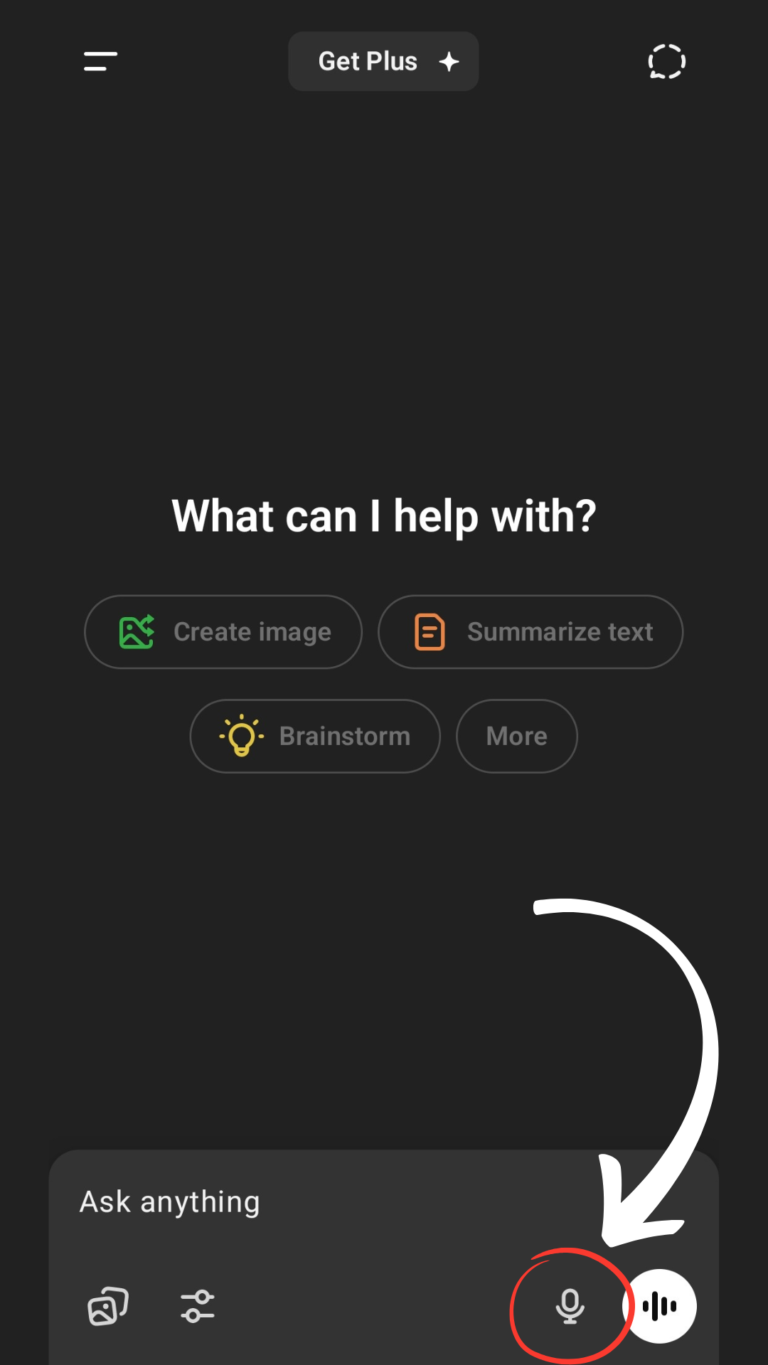
Use voice to revise or clarify topics during walks, commutes, or when reading hands-free.
Example Voice Prompt:
“Explain the difference between weathering and erosion with examples.”
3. Image Input
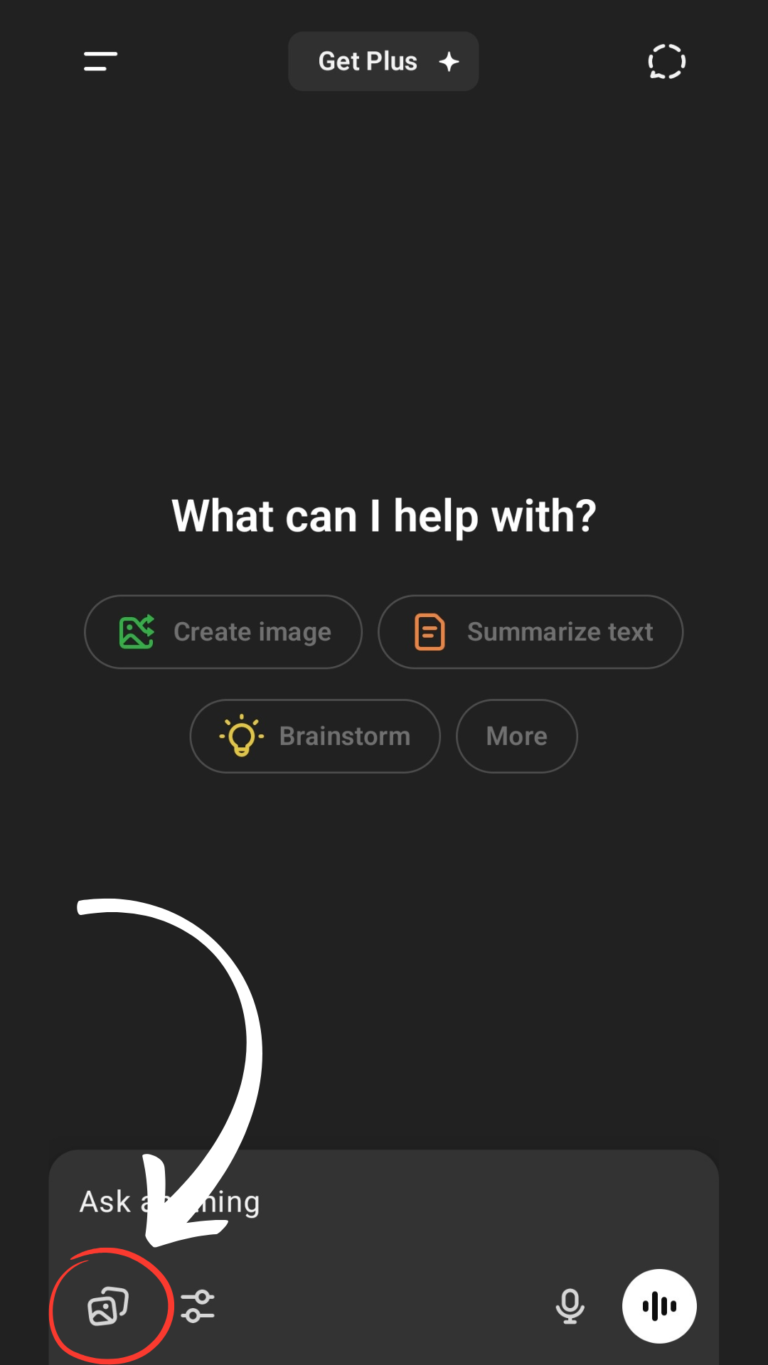
Upload NCERT diagrams, maps, or even newspaper clippings. ChatGPT can explain them and convert them into bullet notes.
Example Use Case:
Upload a budget infographic and ask: “Explain the highlights of this budget for GS Paper III.”
ChatGPT Prompt Examples For Solving Question From IAS Exam Subjects.
Example 1: IAS General Studies – Polity (Prelims + Mains)
“Explain the doctrine of separation of powers in the Indian context.”
Your ChatGPT Text Prompt
“Explain the meaning of separation of powers and how it applies to India, with examples from the Constitution.”
How ChatGPT Will Answer (Like a Personal Tutor):
ChatGPT currently supports 20 Indian languages. Some are - Hindi, Bengali, Gujarati, Kannada, Malayalam, Marathi, Tamil, Telugu, and Urdu.
Click to enlarge.
Example 2: IAS GS Paper III – Economics
“What is stagflation? How can it impact the Indian economy?”
Your ChatGPT Text Prompt
“Define stagflation, give its key features, and explain its possible impact on India’s economy with examples.”
How ChatGPT Will Answer (Like a Personal Tutor):
ChatGPT currently supports 20 Indian languages. Some are - Hindi, Bengali, Gujarati, Kannada, Malayalam, Marathi, Tamil, Telugu, and Urdu.
Click to enlarge.
Example 3: IAS Essay Writing / Ethics Paper
“Give me an outline for an essay on ‘Technology and Ethics in the 21st Century.’”
Your ChatGPT Text Prompt
“Create a structured outline for an essay on technology and ethics, highlighting major issues, challenges, and solutions.”
How ChatGPT Will Answer (Like a Personal Tutor):
ChatGPT currently supports 20 Indian languages. Some are - Hindi, Bengali, Gujarati, Kannada, Malayalam, Marathi, Tamil, Telugu, and Urdu.
Click to enlarge.
Practice and Perfect Your Prompts with Our AI Tutor (Powered By Gemini)
How It Works –
- Choose Your Course: Select the subject you want to practice.
Get Your Question: Our AI will ask you a question from the official syllabus.
Write Your Prompt: Try to get the answer by writing the best prompt you can.
Receive Instant Feedback: The AI will provide the correct answer and review your prompt, giving you tips to make it better.
AI Study Assistant
Your AI-Powered Edge in Tackling the IAS Exam
The IAS exam is not just about knowledge—it’s about clarity, articulation, and smart revision. ChatGPT bridges the gap between textbooks and understanding, providing real-time explanations, summaries, and insights tailored to the syllabus. Whether it’s decoding editorials, drafting model answers, or revising GS concepts, ChatGPT is like a civil services coach in your pocket.
When used wisely alongside your books and test series, ChatGPT can transform how you study, retain, and apply concepts—giving you the AI-powered edge in your UPSC journey.
Written By
Prateek Singh.
Last Updated – August, 2025
About The Author
Prateek Singh believes the best way to learn is to get your hands dirty. He went from talking to customers in sales to building the online platforms they use. IndiaShouldKnow.com is his way of sharing that practical, hands-on knowledge with you.
FAQs About Using AI.
Q: Can I trust every answer an AI tool gives me for my studies?
A: No, you should not trust every answer completely. Think of an AI as a super-smart assistant that has read most of the internet—but not every book in the library is accurate.
AI can sometimes make mistakes, misunderstand your question, or use outdated information.
It can even “hallucinate,” which means it confidently makes up an answer that sounds real but is completely false.
Rule of Thumb: Use AI answers as a great starting point, but never as the final, absolute truth. Always double-check important facts.
Q: How can I verify the information I get from an AI for my academic work?
A: Verifying information is a crucial skill. It’s like being a detective for facts. Here are four simple steps:
Check Your Course Material: Is the AI’s answer consistent with what your textbook, lecture notes, or professor says? This is your most reliable source.
Look for Reputable Sources: Ask the AI for its sources or search for the information online. Look for links from universities (.edu), government sites (.gov), respected news organizations, or published academic journals.
Cross-Reference: Ask a different AI the same question, or type your question into a standard search engine like Google. If multiple reliable sources give the same answer, it’s more likely to be correct.
Use Common Sense: If an answer seems too perfect, too strange, or too good to be true, be extra skeptical and investigate it further.
Q: What is the difference between using AI for research and using it to plagiarize?
A: This is a very important difference. It’s all about who is doing the thinking.
Using AI for Research (Good ✅):
Brainstorming topics for a paper.
Asking for a simple explanation of a complex theory.
Finding keywords to use in your library search.
Getting feedback on your grammar and sentence structure.
You are using AI as a tool to help you think and write better.
Using AI to Plagiarize (Bad ❌):
Copying and pasting an AI-generated answer directly into your assignment.
Asking the AI to write an entire essay or paragraph for you.
Slightly rephrasing an AI’s answer and submitting it as your own original thought.
You are letting the AI do the thinking and work for you.
Q: How can I use AI ethically to support my learning without violating my school's academic honesty policy?
A: Using AI ethically means using it to learn, not to cheat. Here’s how:
Know the Rules: First and foremost, read your school’s or professor’s policy on using AI tools. This is the most important step.
Be the Author: The final work you submit must be yours. Your ideas, your structure, and your arguments. Use AI as a guide, not the writer.
Do the Heavy Lifting: Use AI to understand a topic, but then close the chat and write your summary or solve the problem yourself to make sure you have actually learned it.
Be Transparent: If you used an AI in a significant way (like for brainstorming), ask your professor if you should mention it. Honesty is always the best policy.
Q: Can an AI's answer be biased? How can I detect this in its responses?
A: Yes, an AI’s answer can definitely be biased. Since AI learns from the vast amount of text on the internet written by humans, it can pick up and repeat human biases.
Here’s how to spot potential bias:
Look for Opinions: Does the answer present a strong opinion as a fact?
Check for One-Sidedness: On a topic with multiple viewpoints (like politics or economics), does the AI only show one side of the argument?
Watch for Stereotypes: Does the answer use generalizations about groups of people based on their race, gender, nationality, or other characteristics?
To avoid being misled by bias, always try to get information from multiple, varied sources.
Q: Is it safe to upload my personal notes, research papers, or assignments to an AI tool?
A: It is best to be very careful. You should not consider your conversations with most public AI tools to be private.
Many AI companies use your conversations to train their systems, which means employees or contractors might read them.
There is always a risk of data breaches or leaks.
A Simple Safety Rule: Do not upload or paste any sensitive information that you would not want a stranger to see. This includes:
Personal identification details.
Confidential research or unpublished papers.
Your school assignments before you submit them.
Any financial or private data.
Related Articles
Sign Up for Our Newsletter To Learn More About the Latest In AI And Learn How To Use It.
Unlock your learning potential and stay ahead in the age of AI! Join the IndiaShouldKnow.com newsletter to discover how to seamlessly integrate AI into your studies for school, entrance exams, college courses, for your Career and Life. Plus, get the latest insights on cutting-edge AI tools that can empower your career and enrich your life. Subscribe now for monthly updates.

